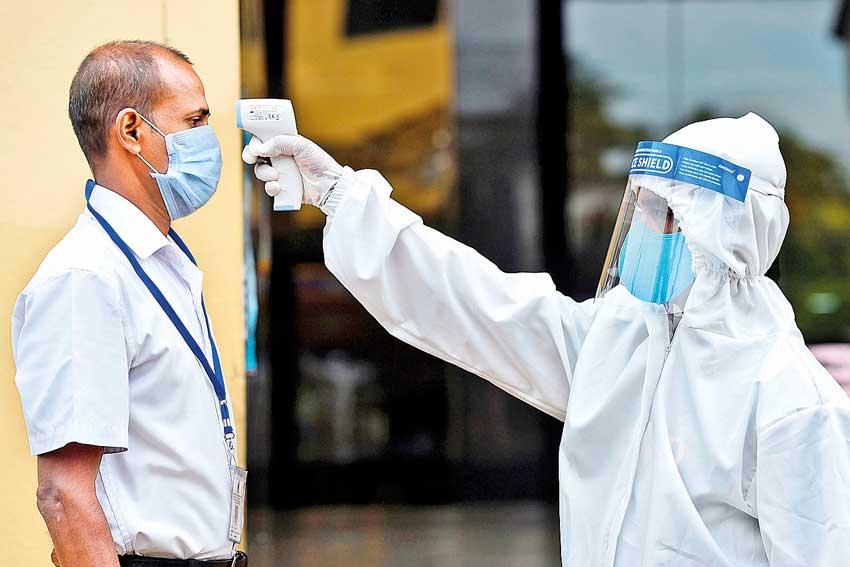Reply To:
Name - Reply Comment

Based on this, local health experts have observed that Sri Lanka is in fact in the level three of community transmission (CT3) - AFP
 Last week, health authorities conceded that Sri Lanka has reached the community transmission level of the covid-19 pandemic. According to the four-level alert system adopted by the Health Ministry, a country is at Alert Level 3 (community transmission level) when several clusters are reported across different districts. That is an escalation from Level 2 when there is only one cluster. And during the Level 4, the final level, cases appear with no connection to any cluster. Activities permitted in the country are subjected to the alert level.
Last week, health authorities conceded that Sri Lanka has reached the community transmission level of the covid-19 pandemic. According to the four-level alert system adopted by the Health Ministry, a country is at Alert Level 3 (community transmission level) when several clusters are reported across different districts. That is an escalation from Level 2 when there is only one cluster. And during the Level 4, the final level, cases appear with no connection to any cluster. Activities permitted in the country are subjected to the alert level.
This is still a rather generalised gauge of the virus spread. To provide more clarity on the community transmission level and its intensity, the World Health Organization recently provided an update of the transmission classification. Accordingly, the community transmission (CT) classification is divided into four levels, from low incidence (CT1) to very high incidence (CT4). Based on this, local health experts have observed that Sri Lanka is in fact in the level three of community transmission (CT3), defined as high incidence of locally acquired widely dispersed cases in the past 14 days.
Sri Lanka’s COVID-19 toll is still modest in international comparison, however, even the lower numbers have already strained the health facilities, leading to long delays in PCR test results, crowding of hospitals, and disruption in overall health services
During the last six weeks, since the discovery of the first confirmed case of the second wave in Minuwangoda on October 1, new infections have surpassed 15,000. The total number of cases stood at 15,723, yesterday noon, a nearly five-fold increase from the number at the beginning of October.
Sri Lanka’s COVID-19 toll is still modest in international comparison, however, even the lower numbers have already strained the health facilities, leading to long delays in PCR test results, crowding of hospitals, and disruption in overall health services.
Colombo District was re-opened on Monday November 9 after 10 days of quarantine curfew that was announced after the discovery of a fast-spreading cluster originating from the Peliyagoda Fish Market. Fresh infections linked to the two original clusters continue to surface unabated- with many new cases, mainly from Colombo and Gampaha, but also spilling over to other districts, were reported.
Having shut down the country, rightly so, for two months during the early phase of the epidemic, the government cannot afford another complete lockdown. The economic cost has been substantial, which is partly why the Central Bank has not yet released the economic data of the second quarter of this year.
The second wave has proved to be far more contagious and also fatal. There were a total of 48 deaths, of which 35 were reported during the last six weeks.
However, economic realities should prompt the government to take a comprehensive look at the available COVID-19 containment measures. The opening of Colombo suggests that the government has ruled out a prolonged lockdown. That is a sensible decision. However, there is a catch. It should be accompanied by a well spread out testing and technology-driven contact tracing strategy. Whether these measures are in place is the question. All the available evidence suggests they aren’t.
The failure to scale up testing capacity was at the heart of the second wave. The implosion of the virus in factories and market places would not have happened if adequate random testing were carried out. Even as of October 1, Sri Lanka conducted barely 3000 tests, which is simply inadequate. In other words, much of official planning was done in the dark, with no clear idea of the prevalence of the virus in society. As way back as April, the Government’s Medical Officers Association (GMOA) called on the health ministry to scale up PCR testing capacity to a minimum of 10,000 daily tests. There were also calls to introduce rapid antigen testing to offset the shortfall. Rapid tests are cheaper, faster, but also can give false negatives. Still, they provide a cost-effective means for mass testing in factories, schools and workplaces.
The limitations of testing capacity and its consequences are all too clear now. However, the health ministry has not yet imported the kits of the rapid tests, though it is waiting for a stock from the WHO. At the same time, the recent import of large quantities of the rapid test by a local pharmaceutical firm has raised concerns that a business mogul close to the government is plotting to skim some money out of the medical emergency. Corruption allegations would seriously compromise the national response to COVID – also any unsubstantiated and politically charged allegations are in bad taste at a time when the country confronts a grave medical contingency of generations.
The first response to the new wave of the COVID-19 should not be a lockdown. At the same time, Sri Lanka cannot go on, as usual, relying on guesswork.
If the country is to remain both safe and open, health authorities should adopt an aggressive testing strategy that covers all the high-risk individuals and places.
The Government has now announced travel restrictions between the Western province and other provinces until November 15.
Follow @RangaJayasuriya on Twitter